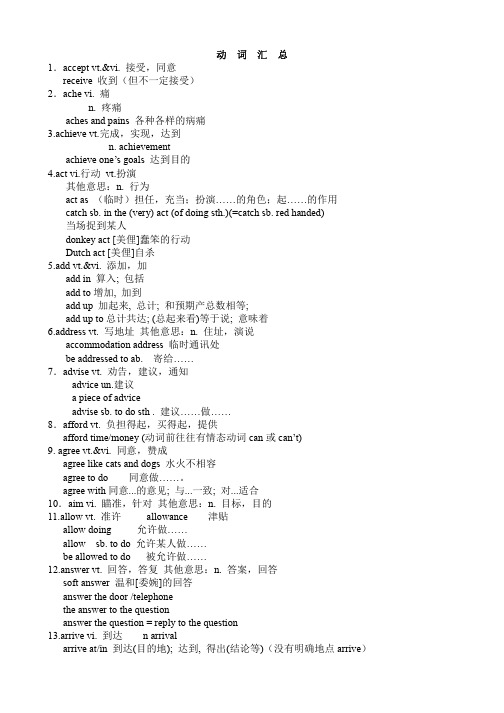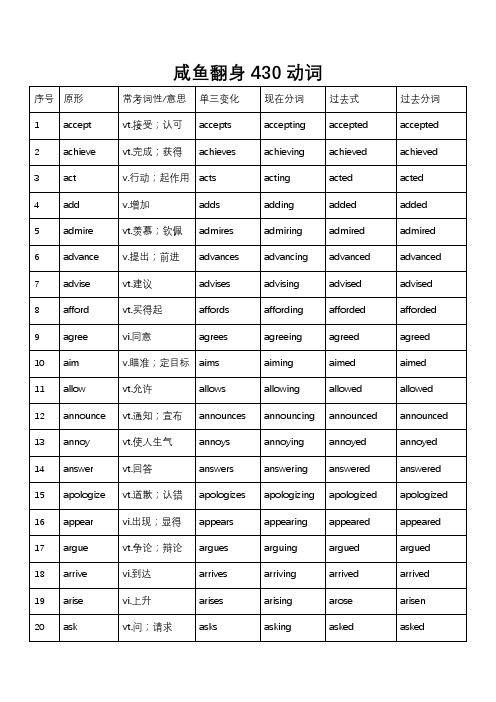中考36个高频常见动词用法汇总
- 格式:doc
- 大小:50.00 KB
- 文档页数:6


todo,doing,do中考高频动词考点汇总今天就来总结一下初中阶段高频出现的一些动词用法,让你从此告别看到to do, doing, do就一脸懵的囧状。
一、加to do的高频考查动词1. afford to do 负担的起做某事We can’t afford to make any mistakes.我们承担不起任何失误。
2. agree to do同意做某事Do you agree to have dinner today?今天你同意一块吃饭吗?3. choose to do 选择做某事Why do so many choose to leave their country?为什么有这么多人要离开祖国?4. decide to do 决定做某事She decided to accept the offer.她决定接受这一提议。
5. expect to do 期待做某事The shop expects to make more money this year.这家店铺期望今年多赚点钱。
6. hope to do 希望做某事Ihope to see you again sometime next year.我希望明年某一时候再见到你。
7. hurry to do 急忙做某事We shall have to hurry to get there in time.我们将不得不及时赶到那。
8. manage to do 设法做成某事How do you manage to do such a thing?你是怎么设法做这样的事?9. plan to do 打算做某事Where do you plan to spend your holiday?你打算去哪里度假?10. prefer to do 宁愿做某事Iprefer to travel in the front of the car.我宁愿坐在汽车的前面。


初中语文阅读动词归纳总结动词是语言中的重要组成部分,常常用于描述人或物的动作、状态、心理活动等。
在初中语文学习中,我们经常需要进行阅读理解,而对于动词的理解和应用是至关重要的。
下面是对初中语文阅读中常见动词进行的归纳总结:1. 描述人物行为的动词1.1. 行走类:步行、奔跑、快跑、慢跑、蹦跳、跳跃、走过、穿过、走上、爬上、下来、上去等。
例句:他快步走向学校。
1.2. 看类:看、注视、瞧、望、凝视、看见、观看、注视、目送等。
例句:她专注地看着黑板上的字。
1.3. 说话类:说、叫、呼喊、喊叫、告诉、问、答复等。
例句:老师告诉我们下午有一堂重要的讲座。
1.4. 吃喝类:吃、喝、喂、吞咽、抿嘴等。
例句:他匆匆地吃完早餐。
1.5. 做类:做、干、制作、搭建、安装、修理、制定、设计等。
例句:她喜欢亲自动手制作礼物。
2. 描述事物状态的动词2.1. 存在类:有、存在、出现、消失、隐藏、现身、离开等。
例句:昨天的问题已经解决了。
2.2. 感知类:看见、听到、闻到、触摸、感受、察觉、发现等。
例句:她听到了一阵悦耳的音乐。
2.3. 变化类:变化、改变、变得、变成、增加、减少等。
例句:这种草原在季节更替中呈现出不同的颜色。
2.4. 状态类:坐、站、躺、趴、站立、躺下、卧、坐下、站起、起飞等。
例句:他坐在椅子上读书。
2.5. 闪烁类:闪烁、发光、照亮、明亮等。
例句:夜空中闪烁着点点星光。
3. 描述心理活动的动词3.1. 思考类:考虑、思考、想念、回忆、回想、回忆等。
例句:我仔细考虑了这个问题。
3.2. 感受类:喜欢、爱、怕、害怕、厌恶、羡慕等。
例句:她害怕黑暗的房间。
3.3. 意愿类:希望、愿意、愿望、想要、要求等。
例句:他希望能够成为一名演员。
3.4. 判断类:认为、觉得、感到、以为、料想等。
例句:我认为这是一个好主意。
3.5. 期待类:期待、盼望、等待、守候等。
例句:她期待着暑假的到来。
通过对初中语文阅读中常见的动词进行归纳总结,我们可以更好地理解和应用这些动词,在阅读理解和写作中更加准确地描述人物行为、事物状态和心理活动。

1. let sb do 让某人干某事= make sb do2. feel sb do 感觉某人做某事3.had better do 最好干……had better not do最好不干……4.Why don’t you +V原=Why not+V原为什么不干……5. will +V原didn’t+V原don’t+V原doesn’t+V原6. must 必须should 应该情态V can 能 ++V原could 能may 可以might 也许情态东西否定形式,也+V原如:can't________(sleep) mustn’t _________(go)7.W ould you please do…?你可以做某事吗?Would you please not do…?你可以不做某事吗?8. Shall we do…?我们要做某事吗?第一 first第二 second第三 third第四 fourth第五 fifth第八 eighth第12 twelfth“也”too 肯定,句末also 肯定,句中either 否定,句末Don’t swim,_________. 1. allow sb to do 允许某人干某事should be allowed to do应该被允许干某事should not be allowed to do应该不被允许干某事2. ask sb to do 让某人干某事ask sb not to do 让某人不要干某事3. tell sb to do… 告诉某人干某事tell sb not to do 告诉某人不要干某事4. invite sb to do 邀请某人干某事some advice(不加s,不可数N)一些建议6. want to do 想要干某事7. would like to do 想要干某事8. .need to do 需要干某事10.seem to do 似乎干某事11.decide to do 决定干某事12.have to do 不得不做某事13.refuse to do 拒绝做某事14.offer to do 主动干……volunteer to do 志愿做某事15.plan to do 计划干某事16.be able to do 能够干某事be unable to do 不能干….17.in order to 为了……expect to do 期望干某事wish to do 希望做某事19.what to do 干什么how to do 怎样做when to do 什么时间做去哪里……的道路make sb’s way to 前往……22.feel free to do 随便干某事23.encourage sb to do鼓励某人干某事24. a good place to do 一个干……的好地方a good way to do.. 一个干..的好方式a good time to do一个干..的好时候25. It 开头的 2个重点句型It takes +人+时间+to do句型花费某人多长时间干某事It’s+adj.+(for sb.)to do做某事对某人+形容词(做这件事对你好)It’s+adj.+of sb.to do某人做某事+形容词(你做这事真好)make it +adj+ to do.. 使干…怎么样如:make it possible to do..使干….成为可能It’s time to do…到了该做……的时候了It’s sb’s duty to do做某事是某人的责任26.Don’t forget to do 别忘记干…29.30.agree to do 同意干.……disagree to do 不同意干……努力干….try doing 尝试干……害怕干…33.warn sb to do警告某人干某事warn sb not to do34. dare to do 敢做……35. fail to do 没有成功做某事36. be+adj.+enough to do足够+形容词做某事37. sb.is ready to do某人准备好做某事38. prefer to do A ratherthan B 宁愿做A而不愿做B对比:prefer doing A to doing B比起做B,更喜欢做A39.have nothing to do with与某事无关40. the first thing to do第一件要做的事……the+序数词+N+ to do第…个干……的……41. add to do 补充做某事42.urge sb to do催促某人做某事cate sb to do教育某人做某事44.order sb to do命令某人做某事45. happen to do 碰巧做某事46.lead sb to do领导某人做某事47. have an opportunity todo 有机会做某事48. be sure to do一定会做某事1. be always doing 总是干某事2. be busy doing 忙于干某事 对比 :be busy with sth 忙于某事 3. enjoy doing 喜欢干某事 4. like doing 喜欢干某事 love doing 喜爱干某事 5. feel like doing 想要做…… 6. 对比 would like to do 7. keep doing 一直干某事 (kept 过-kept )keep sb doing 使某人一直做某事8. keep on doing 坚持干某事waste time doing 浪费时间干某事 9.stop/keep/prevent …from doing 阻止某人做某事9. finish doing 完成干某事 10. mind doing 介意干某事don ’t mind+doing 不介意干… can’t stand doing 不能忍受干… can't help doing 情不自禁干……11.… 12.(spend--spent 过-spent )花……干某事.对比:spend …on +N in 可以省略,on 不可以省略 13. have problems (in )+doing ==have difficulties (in )+doing干……有问题havetrouble doing 做某事有困难 12.succeed in doing 成功干某事of ;up 往下;沿着 before 反对;靠着如:be interested in doing 对……感兴趣be good at doing 擅长于干…How about doing ==What about doing干……怎么样?thanks for doing 因…而感谢 Thanks for helping me.谢谢你帮我.=Thanks for your help me.14. to 竟然为介词时,4个不正常的词组如下:期望干某事pay attention to doing 注意干… stick to doing 坚持干某事习惯于干某事used to do 过去常常干某事 15. be willing to do 乐意干某事 16.take up doing 从事干某事 end up doing 以做某事结束 give up doing 放弃做某事 17. avoid doing 避免干某事 18.consider doing 考虑干某事19.be afraid of doing 害怕做某事20. do some cooking/cleaning/ reading/shopping/washing做点饭/打扫一下卫生/读点书/逛逛街/洗洗衣服21. go swimming/fishing/ shopping/skating/boating去游泳/钓鱼/ 逛街/滑冰/划船 22. have fun doing 很开心做某事23. waste time/money doing浪费时间或金钱做某事24. instead of doing 代替做某事对比: instead+句子 25. miss doing 错过做某事 26. hold on to doing 坚持做某事27. suggest doing 建议做某事 28. put off doing 推迟做某事 29. succeed in doing 成功做某事30. prefer doing A to doing BB ,更喜欢做Aprefer to do A ratherthan B 宁愿做A 而不愿做B1.be+adj; stay+adj; keep+adj; feel+adj 。

中考英语必考语法大全一. 动词be(is,am,are)的用法我(I)用am, 你(you)用are,is跟着他(he)、她(she)、它(it)。
单数名词用is,复数名词全用are。
变否定,更容易,be后not加上去。
变疑问,往前提,句末问号莫丢弃。
还有一条须注意,句首大写莫忘记。
二. this,that和it用法(1)this和that是指示代词,it是人称代词。
(2)距离说话人近的人或物用this, 距离说话人远的人或物用that。
如:This is a flower. 这是一朵花。
(近处)That is a tree. 那是一棵树。
(远处)(3)放在一起的两样东西,先说this, 后说that。
如:This is a pen. That is a pencil. 这是一支钢笔。
那是一支铅笔。
(4)向别人介绍某人时说This is…, 不说That is…。
如:This is Helen. Helen, this is Tom. 这是海伦。
海伦,这是汤姆。
(5)This is 不能缩写, 而That is可以缩写。
如:This is a bike. That’s a car. 这是一辆自行车。
那是一辆轿车。
(6)打电话时,介绍自己用this, 询问对方用that。
如:—Hello! Is that Miss Green? 喂,是格林小姐吗?—Yes, this is. Who’s that? 是的,我是,你是谁?注意:虽然汉语中使用“我”和“你”,但英语中打电话时绝不可以说:I am…, Are you…?/Who are you?(7)在回答this或that作主语的疑问句时, 要用it代替this或that。
如:①—Is this a notebook? 这是笔记本吗?—Yes, it is. 是的,它是。
②—What’s that? 那是什么?—It’s a kite. 是只风筝。
三. these和those用法this, that, these和those是指示代词,these是this的复数形式,指时间、距离较近的或下面要提到的人或事;those是that的复数形式,指时间、距离较远或前面已经提到过的人或事物。
动词的用法归纳总结动词是语言中非常重要的一部分,是表达动作、状态、感觉和心理活动的重要手段。
在汉语中,动词的使用具有丰富的内涵和广泛的应用,可以通过时态、语气、语态等方式来表达不同的意义。
以下是关于动词的用法的归纳总结,希望对你有所帮助。
一、动词的基本用法:1. 表示动作或状态:如“跑、写、喜欢、是”等2. 搭配时间状语或地点状语,表示动作的时间、地点:如“在家里学习”、“昨天去了公园”等二、动词的时态:1. 现在时:表示现在进行的动作或状态,如“我在吃饭”、“他喜欢唱歌”。
2. 过去时:表示过去发生的动作或状态,如“昨天我看了一部电影”、“他在学校读书”。
3. 将来时:表示将来要发生的动作或状态,如“明天我要去旅游”、“他将来会成为一名医生”。
三、不同动词的用法:1. 及物动词:需要接受动作的宾语,如“吃、看、读”,需要接宾语才能完整表达意思。
2. 不及物动词:不需要接受动作的宾语,自身就可以表达完整的意思,如“跑、笑、睡”。
四、动词的语气:1. 虚拟语气:表示假设、愿望等,如“要是我有时间就去”、“希望他早点回来”。
2. 祈使句:表示请求、命令等,如“请你帮我一个忙”、“快点走!”。
五、动词的语态:1. 主动语态:主语是动作的执行者,如“老师讲课”、“他写信”。
2. 被动语态:主语是动作的承受者,如“这本书被我借走了”、“他被邀请参加了会议”。
以上是对动词的用法做了简单的总结,希望可以帮助你更好地理解和运用动词。
动词在语言中起着非常重要的作用,掌握动词的用法对于提高语言表达能力有着重要的意义。
动词的用法还有很多细节和复杂之处,需要我们在实际运用中不断学习和提高。
中考英语动词用法汇总在中考英语中,动词的用法至关重要。
动词不仅数量众多,而且变化多样,掌握好动词的用法对于取得优异的英语成绩有着关键作用。
接下来,我们就对中考英语中常见的动词用法进行一个全面的汇总。
一、动词的基本形式1、动词原形动词原形是动词的最初形式,如“play”“eat”“run”等。
在一般现在时中,当主语是第一人称、第二人称、复数人称时,通常使用动词原形。
2、第三人称单数形式当主语是第三人称单数(he、she、it 或单个的人名、地名、事物名等)时,动词要使用第三人称单数形式。
一般情况下,在动词原形后加“s”,如“plays”“eats”“runs”。
但也有一些特殊的变化规则,比如以“s”“x”“ch”“sh”“o”结尾的动词,加“es”,如“passes”“fixes”“watches”“washes”“goes”。
还有一些动词的第三人称单数形式变化不规则,需要特别记忆,如“have”的第三人称单数形式是“has”。
3、现在分词现在分词通常用于进行时态,由动词原形加“ing”构成。
一般情况下,直接加“ing”,如“playing”“eating”“running”。
但也有一些特殊情况,如以不发音的“e”结尾的动词,要去掉“e”再加“ing”,如“write”的现在分词是“writing”;以重读闭音节结尾且末尾只有一个辅音字母的动词,要双写末尾的辅音字母再加“ing”,如“swim”的现在分词是“swimming”。
4、过去式过去式用于一般过去时,表示过去发生的动作或存在的状态。
大部分动词的过去式是在动词原形后加“ed”,如“played”“ate”“ran”。
但也有很多不规则动词,其过去式需要单独记忆,如“go”的过去式是“went”,“see”的过去式是“saw”。
5、过去分词过去分词通常用于完成时态和被动语态。
其构成方式与过去式有一定的相似性,但也有不规则的情况。
规则动词的过去分词一般与过去式相同,不规则动词则需要单独记忆。
中考英语动词大全本文档旨在提供中考英语研究者一个动词大全,以帮助大家系统地研究和记忆常用动词。
动词的定义动词是表示人、事物或状态的行为或运动的词。
它可以用来表达动作、状态、意愿、情感等。
常用动词列表以下是一些常用的动词及其汉语意思:- be:是,存在be:是,存在- have:有have:有- do:做do:做- make:制造,做make:制造,做- go:去go:去- get:得到get:得到- say:说say:说- see:看见see:看见- take:拿,取take:拿,取- can:能够can:能够- will:将要will:将要- give:给予give:给予- find:找到find:找到- think:思考think:思考- know:知道know:知道- want:想要want:想要- need:需要need:需要- like:喜欢like:喜欢- love:爱love:爱- believe:相信believe:相信- say:说say:说- feel:感觉feel:感觉- work:工作work:工作- call:打电话call:打电话- try:尝试try:尝试- ask:问ask:问- use:使用use:使用- tell:告诉tell:告诉以上只是一部分常用动词的例子,你可以根据具体语境和需要进一步研究和掌握更多动词。
总结动词在英语研究中起着重要的作用,它们帮助我们表达动作、状态和情感。
通过系统地研究和练动词,我们能够提高自己的英语表达能力。
希望本文档对你的中考英语研究有所帮助!注意:本文档提供的动词仅供参考,可以根据自己的需要和研究进度进行扩展和调整。
初中中考高频单词一、动词(v.)1. be [biː] (am/is/are)- 用法:是,在(表示存在、状态等)。
例如:I am a student.(我是一名学生。
)2. have [hæv] (has)- 用法:有。
例如:He has a book.(他有一本书。
)3. do [duː] (does)- 用法:做,干。
例如:What do you do?(你是做什么的?)4. go [gəʊ]- 用法:去。
例如:I go to school every day.(我每天去上学。
)5. get [get]- 用法:得到;到达。
例如:I get a present.(我得到一个礼物。
);I get to school at 8:00.(我8点到达学校。
)二、名词(n.)1. time [taɪm]- 用法:时间;次数。
例如:What time is it?(几点了?);I have been there three times.(我去过那里三次了。
)2. student ['stjuːdnt]- 用法:学生。
例如:There are many students in the classroom.(教室里有很多学生。
)3. school [skuːl]- 用法:学校。
例如:Our school is very beautiful.(我们的学校非常漂亮。
)4. family ['fæməli]- 用法:家庭;家人。
例如:My family is big.(我的家庭很大。
);My family like to travel.(我的家人喜欢旅行。
)5. friend [frend]- 用法:朋友。
例如:He is my best friend.(他是我最好的朋友。
)三、形容词(adj.)1. good [gʊd]- 用法:好的。
例如:He is a good boy.(他是一个好男孩。
36个高频常见动词用法汇总1.askA.问1) vt. May I ask you a question?I have something to ask you.Jack asked me how to start the machine. She asked what time it was.2) vi. I asked only out of curiosity.Tom went to ask about the train.If you don’t under stand, ask.B.要求;请求;征求vt.I’m going to the workers to ask their advice. He asked Joe to get in touch with them.He was asked to see them off.C.邀请vt. They asked us over their dinner. They often ask him out to sea.D.习语ask about…询问、打听ask for…请求、找某人、要求ask sth. of sb. 向某人问2.break vt.A. 打破、打碎、打断Who broke the window into pieces?He fell and broke his leg.Try not to break the silence.B.违反He often breaks his promise/his word/ the law/ the rule.C.习语break away突然离开break away from sb.脱离、离开、背弃break down 中断、粉碎、发生故障、(身体)跨了、(机器)坏了break in闯进、打断break into…闯入、侵占break…into pieces打碎break off折断、突然中断break through…突破break sb’s heart使某人心碎3.bringA. vt. 带来、拿来(由远而近)Bring me the paper, please.He forgot to bring his umbrella.May I bring her to see you?Shall I bring the books upstairs?After we were seated, she brought out dishes.B.习语bring…about造成、导致bring… down打落(飞机、禽鸟等)、降低(物价、温度等)bring… forward提出bring…in引进、介绍、收获bring…into effect/practice实行、贯彻bring…out出版、发表brin g…to an end/ a stop/ a close使终止、结束bring…up养育、呕吐4.catchA. vt. 抓住、逮住、挂住The nail caught my coat.He caught my hand and held it tightly.We caught ten monkeys in all.但是vi. 挂住His coat caught on a nail.The kite caught in a tree.B.赶上、搭上We’ll hu rry and catch the 10:30 bus.C.听懂Pease repeat it. I didn’t quite catch you.Do you catch my meaning?D.染上He caught a bad flu.E.(出其不意地)撞上、碰上She caught him smoking.Some boys were caught stealing flowers from the garden.F. 给撞上、碰上The ship was caught in a hurricane.One night we were caught in a thunderstorm. Hurry up and don’t get caught in a storm.G.习语catch at sth. 想抓住、设法抓住catch sb. by surprise出其不意抓住catch/get/seize/take hold of…(突然)抓住、抓牢catch sb’s attention/eye吸引某人注意catch sight of…看到、发现ca tch the point of…抓住…的要点catch up赶上catch up with…赶上…5.doA. aux. v.(1) 帮助构成一般过去时或一般现在时的疑问或否定式They do not believe it. When id they arrive there?(2) 用在肯定句和祈使句中加强语气I do miss you, Mum. She does sing well. Do be on time. So she did come after all.(3) 用来表示前边提到的动作(以免重复) ---May I come round in the evening? ---Yes, please do.I knew he would help us, and he did.(4) 用于某些倒装句中Only then did I realize he had been wrong. Never did he know anything about it.B. 做vt. Can I do anything for you?We often do our homework together.The glass is broken. who did it?We did some reading last night.She did most of the talking.C. vi. (1) 表示生活、学习等情况How do you do?They did very well in English but badly in maths.How did you do in the exam? How are you doing?(2) 行了、够了、可以On e piece of bread will do.Talking with your mouth full won’t do.(3) 做、办Do as you are told to.When in Rome, do as the Romans do.Let her do as she likes.D.习语do…with…处理What have you done with my bike?can do wi th…将就用I can do with the old bed.do something about…对…采取措施do sb. a favor=do a favor for sb.帮某人个忙do away with…废除、破除、去掉do sb. good/harm/wrong= do good/harm/wrong to sb. 对某人有益/有害/冤枉某人do one’s best/ bit/part=do everything/all/what one can尽力do …up包扎、扣(纽扣)do without…没有…也行、不需要have something to do with…与…有关do right/wrong做得对/做错了6.expect1. vt. 期待、预料、等待It’s what we’ve expected.Is this the letter you have been expecting?We expect to finish the work by Friday.I expect that they will drop in.I expect you to make more progress.---Will he be back tonight? ---I expect so. You arrived earlier than we had expected.2.习语as (is/ was/ has been) expected不出所料They came late again, as was expected.expect too much of sb.对某人期待过高7.feel感觉、觉得A. (1) vt Do you feel any pain when I press here?Facing this situation, they felt both joy and fear.(2) link v. I don’t feel very well today.The busier he is, the happier he feels.The desk feels smooth.(3) vt. 接复合宾语I felt someone go upstairs.I felt a great weight taken off my mind after the exam.She felt their eyes watching her when she came to the stage.She felt herself (to be) right.I felt it my duty to help you.He felt it necessary to talk about his own shortcomings.(4) vt. 宾语从句He felt strongly that we should take some action about the bad practice.B. vt. 摸He felt the pot and it felt very hot.C.习语feel like doing sth.想要feel one’s way摸索前进feel sb’s pulse切脉feel as if/ as though感觉似乎She felt as if she were a member of the family. feel quite oneself 觉得身体很好8.findA. vt. (1) 发现I found a wallet on the street corner yesterday. He found her in danger.=He found that she was in danger.I found him (to be) a tough guy.=I found that he was a tough guy.This method was found to be practical.=It was found that the method was practical.I find it interesting to read these stories.= I find that it is interesting to =read these stories.I found a dog killed in the park.= I found thata dog had been killed in the park.I found a man breaking into a warehouse.= I found that a man was breaking into a warehouse.(2) 找到Have you found the book you have been looking for?B.习语find…out查清楚;弄明白;了解;打听find one’s way to sp.设法赶到;进入They found their way to the front of the crowd.The news found its way to a lot of people. find fault with sb. 对某人吹毛求疵;挑剔find oneself…发现自己…、不自觉地…They found themselves in a difficult situation.Then I found myself surrounded by some boys.He found himself walking in the direction to the park.他发现自己不知不觉地在往公园的方向走。